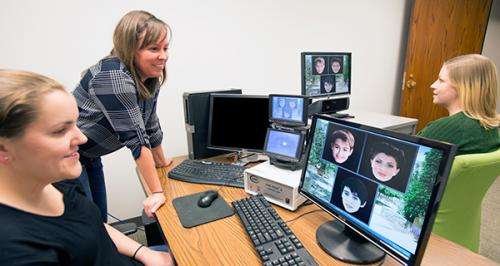Researcher works to uncloak how memories affect attention

When is a sharp memory not a desirable trait?
Cognitive neuroscientist Deborah Hannula wonders whether people's attention can be diverted from a task if there is an object in sight that triggers a memory – a phenomenon she calls "memory-based capture."
The answers she finds may impact the field of mental health.
"It's possible that memory-based capture is slowing us down or making us less effective in a variety of situations, particularly in cases of neurological or psychiatric disorder, like post traumatic stress disorder or anxiety disorder," she says.
Hannula's research into the relatively unexplored field of memory's effects on attention has netted her an Early CAREER Award from the National Science Foundation, the first one to a member of the UWM Psychology Department.
"NSF CAREER grants are one of the nation's premier awards for young researchers who are on their way to becoming the future leaders in their fields," said Rodney Swain, dean of UWM's College of Letters & Science. Our psychology department's rapidly rising national reputation is due in large part to the cutting-edge research conducted by Deborah Hannula and others."
A study on two fronts
Hannula is conducting experiments that measure the eye movements and simultaneous brain function of her participants. Her two-pronged approach is novel among researchers.
Participants in the study will memorize a series of matched pictures – for example, a face paired with a place. Then they'll engage in an attention task, which will require them to to deliberately ignore one item in the studied pairs.
For example, after being shown a picture of the place, participants will attempt to direct their attention away from the corresponding face, looking instead at other faces offered in a visual display. The question is, "Will participants' attention be captured by the corresponding face because their memory of the learned association is triggered by sight of the place?"
Using infrared light projected from a camera to track the participants' eye movements and a software program, Hannula can determine where the participant was looking and for how long.
In addition to following the participants' eyes, Hannula will be using functional magnetic resonance imaging, or fMRI, to find which parts of the brain are active during the memory and attention tasks.
Failure to conceal memory
Hannula's previous work suggests that memory-based capture happens automatically
In one study already completed, two groups of participants performed a matching task. One group was asked to do their best to identify the face, from among three choices, that had been associated with a place. The other group was instructed to deliberately conceal their memory for the studied face-place association.
The results showed that in both cases participants looked almost immediately at the correct match – whether or not they ultimately chose it. In other words, the eyes "give away" a memory that the participants are attempting to hide.
"The next step is to identify how this memory-based capture is supported by the brain," she says.


















